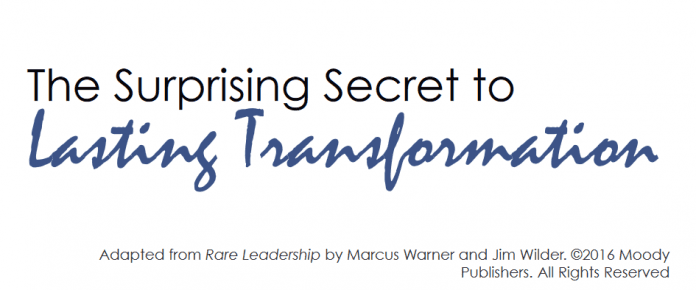by Marcus Warner & Jim Wilder
What happens when leaders don’t lead with emotional intelligence? When they neglect building those “fast-track,” more relational leadership habits?
Probably most of us somewhere along the line have experienced the destruction such leaders leave in their wake. Harvard Business Review coined the term “sandbox leadership”—which, they say, is epidemic.
In the past few months we’ve seen [childish attitudes] reflected in the halls of government and corporate boardrooms across the country. Arrogance, pouting, tantrums, personal attacks, and betrayal of trust seem to be the order of the day. Situations at [some large, well-known corporations] demonstrate the kind of sandbox leadership that is all too prevalent right now. The timing could not be worse. The nation’s current problems, as vast and overwhelming as they are, appear secondary to the whims of spoiled children, unwilling to play well together. At a time when we need solid, grounded leadership more than ever, we seem to be in short supply of adults who act like, well . . . like adults.
Sandbox leaders are grown-ups in positions of responsibility whose lack of emotional maturity creates catastrophic consequences for their unsuspecting followers. The higher a person rises in leadership circles, the more devastating the impact of sandbox leadership can be.
•Churches split
•Affairs occur
•Leaders burn out
•Boards feud with staff
•A trail of wounded people gets left in the dust
All of these crises and more can be traced back to leaders who are competent and charismatic but lack emotional maturity. The current crisis in leadership relates directly to the lack of mature, fast-track skills in leaders throughout our corporations, nonprofits, churches, and government structures. Fast-track skills are the relational habits in the brain that run faster than we can follow consciously. Mature individuals have developed a wide variety of fast-track skills for leading when things go wrong and upset the team. Sandbox leaders become children under pressure. To lead well, we need a new paradigm.
REPENT!
Stephen Covey has been an influential guide to leaders for several decades. In his book The 8th Habit: From Effectiveness to Greatness,he talks about the power of paradigms.
If you want to make minor, incremental changes and improvements, work on practices, behavior or attitude. But if you want to make significant, quantum improvement, work on paradigms.
The term “paradigm shift” came from the philosopher Thomas Kuhn’s 1962 book, The Structure of Scientific Revolutions, where he argued that new facts did little to change how people think. We needed a change of viewpoint. Changing viewpoints is what Jesus meant by the word we translate “repent,” which in Greek means seeing things a whole new way.
Nowhere does the difference between RARE leaders and management-based leaders show up more clearly than in how problems are solved. For leaders, problems are almost always “people problems” and leadership skill involves transforming the way people participate. This paradigm of how people function will determine our understanding of 1) what can change and 2) what will achieve that change. For Western leadership this generally means we provide better information so people make better choices and things will change. Isn’t that how things work?
Sandbox leaders are grown-ups in positions of responsibility whose lack ofemotional maturitycreates catastrophic consequensesfor their unsuspecting followers.
BETTER INFORMATION? BETTER CHOICES?
The traditional paradigm that has dominated Western thought for the last four hundred years can be summed up in a simple equation: Reason + Good Choices = Transformation
This paradigm grew out of the Enlightenment. When René Decartes uttered his famous phrase, “Cogito ergo sum” (“I think, therefore I am”), he started a revolution in philosophy that believed the most important thing about being human was our ability to reason. The British philosophers took this a step further and argued that people are molded by the choices they make. According to these thinkers, choices built on reason (as opposed to superstition, or faith, or revelation) were the best choices. These academics taught a philosophical theory called voluntarism, from which we get our equation “reason + good choices = transformation.” The English brought this very rational idea to the colonies, where it took root and since then underlies many of our assumptions about “how things work”—including in the church.
The idea is that if you give people good information, they can make good choices and change their lives. Most preaching and most discipleship programs are built around this philosophy. Of course, as most preachers can tell you, just giving people good information doesn’t guarantee that they will make good choices or guarantee real life change is going to occur. In fact, in both ministry and business we take it for granted that good information doesn’t necessarily lead to good choices, so we add another element in the hopes of producing changed behavior—accountability.WHY ACCOUNTABILITY DOESN’T WORK
More than once, I (Marcus) have been asked by a ministry leader to develop a discipleship program with some “teeth” in it. By this they mean discipleship that is strong on accountability. Most pastors have figured out that simply telling people what is wise doesn’t mean they are going to do it. So, the assumption is that people need to be told what to do, then forced to report on how they are doing, or nothing will change.
The accountability solution has ruled the business world as well. Voluntarists believe that if we want to see change (either personally or corporately), we need to inform people of how we want them to behave, get them to commit to adopting that behavior, and then hold them accountable to their commitment. (See: performance reviews.) It is virtually a given that any book on leadership will say accountability is the key to transformation.
As widespread and apparently sensible as the accountability solution has become, it has proven to be a massive failure at producing the results it promises. Nearly all discipleship and leadership training we provide our pastors and corporate managers is based on accountability. Yet when we look at the fruit, we see a long history of fallen leaders, relational train wrecks, and discouraged followers.
One of the reasons the accountability paradigm falls short is that the model is fueled by fear. When I meet with my accountability group, I am only happy to see them if I have been successful in keeping my promises. If I have failed, there is fear in the meeting. I am afraid to disappoint the group. I am afraid to fall short of expectations.
I am afraid of the consequences of my failure. More than one accountability group has fallen apart because people simply stopped coming when they started failing.
IDENTITY, BELONGING, AND TRANSFORMATION
Choice runs in the “slow track” of our brain. What, then, runs in the fast track that has executive control? The answer is identity. Who we are determines what we will do and identity operates faster and more powerfully than choices. Identity’s power over choice does not fit our rational mindset. In addition, our brain thinks of who we are not only as an individual but as a group identity as well. Group and individual identities are not the same but they also cannot be separated. I always understand myself in reference to others like me. I am a woman, a carpenter, a Cubs fan, a Canadian, or a leader according to my group identity.
The four RARE habits of exceptional leaders are built around identity and belonging. The power of these two key ingredients, missing in the old paradigm, cannot be exaggerated.
R – Remain relational (belonging)
A – Act like yourself (identity)
R – Return to joy (being glad to be together)
E – Endure hardships well (using hard times to bring us closer)
Belonging and identity also provide the real keys to transformation. When accountability groups work, most of the time it is a byproduct of good group leadership. Strong relationships are formed, a sense of belonging develops, and a positive identity emerges that produces real life change. The more pronounced these identity elements are, the more lasting the transformation. If we were to reduce this solution to a formula, it would be:Identity + Belonging = Transformation
Lasting transformation takes place when a person’s identity changes and that person becomes comfortable in living out of their new identity. The best coaches, pastors, teachers, managers, and leaders are the ones who instill a clear sense of identity into their group and help people understand “This is who we are and this is how it is like us to act.”
* * * * *
MARCUS WARNER (MDiv, ThM, and DMin, Trinity Evangelical Divinity School) is the president of Deeper Walk International. He is a former pastor and college professor who has written several books on topics ranging from how to study the Bible to spiritual warfare, emotional healing, and leadership. Marcus has also led training events for organizations such as Navigators, Willow Creek Prison Ministry, and The Moody Church.
JIM WILDER (PhD, clinical psychology and MA, theology, Fuller Theological Seminary) has been training leaders and counselors for over 27 years on five continents. He is the author of nine books with a strong focus on maturity and relationship skills for leaders. His coauthored book Living from the Heart Jesus Gave You has sold over 100,000 copies in 11 languages. Dr. Wilder is currently executive director of Shepherd’s House Inc., a nonprofit working at the intersection of brain science and theology and founder of Life Model Works, an organization that is building contagiously healthy Christian communities—through equipping existing networks—with the skills to thrive.
To take the RARE Leadership Strengths Assessment or more information about Rare Leadership, visit www.rareleadership.net
1. Richard Davis, “We Need More Mature Leaders,” Harvard Business Review, October 18, 2011, accessed June 4, 2015, https://hbr.org/2011/10/we-need-more-mature-leaders. 2. Stephen Covey, The 8th Habit (New York: Free Press e-book, 2005), 19–20.

















